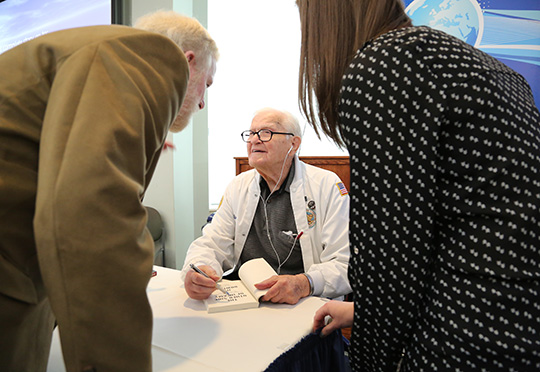 Jim Downing and his bride of six months sat down to breakfast with friends the morning of Dec. 7, 1941, when they heard explosions. Honolulu radio reported that Army Intelligence had confirmed the country was under enemy attack. It was later learned that enemy was Japan.
Jim Downing and his bride of six months sat down to breakfast with friends the morning of Dec. 7, 1941, when they heard explosions. Honolulu radio reported that Army Intelligence had confirmed the country was under enemy attack. It was later learned that enemy was Japan.
Lt. Downing, 103, is the second oldest U.S. survivor of Pearl Harbor, and the father of Elizabethtown College Ralph W. Schlosser Professor of English David Downing. He served as a gunner’s mate first class and postmaster on the USS West Virginia when the attack took place. He was 28 years old.
 Downing spoke to a standing-room-only group, Jan. 19, as a guest of the College’s Center for Global Understanding and Peacemaking, sharing his story and his thoughts about war to more than 150 students, faculty and staff members, and those from the campus community. He signed “The Other Side of Infamy: My Journey Through Pearl Harbor and The World Of War” his book about his experience.
Downing spoke to a standing-room-only group, Jan. 19, as a guest of the College’s Center for Global Understanding and Peacemaking, sharing his story and his thoughts about war to more than 150 students, faculty and staff members, and those from the campus community. He signed “The Other Side of Infamy: My Journey Through Pearl Harbor and The World Of War” his book about his experience.
When the information of the attacks reached Downing, that morning in 1941, the young seaman immediately headed toward the harbor to his ship that had already been hit by nine torpedoes. He manned a fire hose, trying to keep the burning of the ship and bodies under control. “The main damage was done in the first 11 minutes,” he recalled.
Shipmates were lying dead, caught fire attempting to exit the water where oil burned all around them.
“The most vivid memory is my first sight of the ship sinking,” Downing said, noting that the feelings came in waves.
At first, he said, he was surprised, not really grasping what was happening. He’d lived on the ship for years, so seeing it on fire didn’t seem true. Then he felt fear. The first gunner that went through missed; the bullets burrowed in the earth just behind him. He was terrified the second gunner would be more accurate.
Once he knew he was safe, anger surfaced. Anger that they weren’t better prepared and that earlier information received by American political leaders had been ignored. Finally, he let himself feel pride.
“When the men responded,” he said, “they instinctively did the right thing.”
After the attack, Downing headed to a makeshift burn unit. He began collecting the addresses of shipmates who lie on gurneys awaiting treatment. They dictated letters to their loved ones letting them know they had survived the attacks and were OK. Many of them died by the next morning.
Though Downing was a newlywed, he didn’t return home to his bride until the end of December, he said. In the intervening weeks, he said, he washed and combed oil out of his hair every day. “I just couldn’t get it out,” he said. The oil from the ship had burned for several day following the attacks. Everything was covered in it.
Downing encouraged the Elizabethtown College students to “keep America strong.”
“You are soon-to-be voters, soon to be leaders, soon to be taxpayers; it’s up to you to keep America strong in cyber space, on the land, in the sea, in the skies, under the water and above.”

